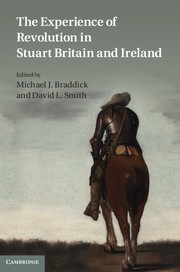Book contents
- Frontmatter
- Contents
- Notes on contributors
- Preface
- List of abbreviations
- JSM
- Introduction: John Morrill and the experience of revolution
- 1 The Scottish–English–Romish Book: the character of the Scottish Prayer Book of 1637
- 2 Popery in perfection? The experience of Catholicism: Henrietta Maria between private practice and public discourse
- 3 Sir Benjamin Rudyerd and England's ‘wars of religion’
- 4 Rhetoric and reality: images of Parliament as Great Council
- 5 Cathedrals and the British Revolution
- 6 History, liberty, reformation and the cause: Parliamentarian military and ideological escalation in 1643
- 7 Sacrilege and compromise: court divines and the king's conscience, 1642–1649
- 8 Law, liberty, and the English Civil War: John Lilburne's prison experience, the Levellers and freedom
- 9 On shaky ground: Quakers, Puritans, possession and high spirits
- 10 James Harrington's prescription for healing and settling
- 11 ‘The Great Trappaner of England’: Thomas Violet, Jews and crypto-Jews during the English Revolution and at the Restoration
- 12 The Cromwellian legacy of William Penn
- 13 Irish bishops, their biographers and the experience of revolution, 1656–1686
- 14 Religion and civil society: the place of the English Revolution in the development of political thought
- Bibliography of the major writings of John Morrill, 1967–2009
- Index
10 - James Harrington's prescription for healing and settling
Published online by Cambridge University Press: 05 August 2011
- Frontmatter
- Contents
- Notes on contributors
- Preface
- List of abbreviations
- JSM
- Introduction: John Morrill and the experience of revolution
- 1 The Scottish–English–Romish Book: the character of the Scottish Prayer Book of 1637
- 2 Popery in perfection? The experience of Catholicism: Henrietta Maria between private practice and public discourse
- 3 Sir Benjamin Rudyerd and England's ‘wars of religion’
- 4 Rhetoric and reality: images of Parliament as Great Council
- 5 Cathedrals and the British Revolution
- 6 History, liberty, reformation and the cause: Parliamentarian military and ideological escalation in 1643
- 7 Sacrilege and compromise: court divines and the king's conscience, 1642–1649
- 8 Law, liberty, and the English Civil War: John Lilburne's prison experience, the Levellers and freedom
- 9 On shaky ground: Quakers, Puritans, possession and high spirits
- 10 James Harrington's prescription for healing and settling
- 11 ‘The Great Trappaner of England’: Thomas Violet, Jews and crypto-Jews during the English Revolution and at the Restoration
- 12 The Cromwellian legacy of William Penn
- 13 Irish bishops, their biographers and the experience of revolution, 1656–1686
- 14 Religion and civil society: the place of the English Revolution in the development of political thought
- Bibliography of the major writings of John Morrill, 1967–2009
- Index
Summary
James Harrington's The Commonwealth of Oceana (1656) has been intermittently famous since publication. Unlike other blueprints for a commonwealth, Oceana did not simply offer reasons for preferring a republic to monarchy. It furnished the first large-scale analysis, and explanation, of the collapse of the Stuart regime. Further, it made an unabashed claim to originality in Harrington's two great discoveries: of the principle of ‘the balance of dominion’ in the foundation, and the separation of ‘dividing and choosing’ in the superstructure. This knowledge might render a republic ‘as…long-lived, as the world’. By 1659 these arguments furnished the basis of a new political science, and satire.
Meanwhile interpretations of Harrington's text have diverged wildly. In the early 1940s Oceana stood at the heart of the celebrated ‘gentry controversy’. In 1945, in a pioneering work by Zera Fink, Tawney's analyst of contemporary economic and social change became a ‘classical republican’. Building on this interpretation, J. G. A. Pocock made Harrington author of a ‘Machiavellian meditation upon feudalism’. Subsequently Harrington's classical republicanism has been depicted as Platonic, Aristotelian, neo-Roman, ‘Virgilianized’, Machiavellian or a synthesis of several of these elements mediated by Polybian constitutionalism. Others have seen in him a utopian, a Stoic, a natural philosopher and the author of a civil religion. For still others Harrington's principal intellectual debt was to Hobbes, an engagement which has been used to problematize the idea of English classical republicanism. In fact this diversity of interpretation reflects a key feature of Harrington's text: its deliberate, and strategic, multi-vocality.
- Type
- Chapter
- Information
- The Experience of Revolution in Stuart Britain and Ireland , pp. 190 - 209Publisher: Cambridge University PressPrint publication year: 2011
- 3
- Cited by



